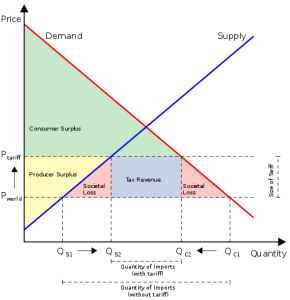
March marks the 1-year anniversary of President Trump’s Section 232 steel and aluminum tariffs, and what could have easily been the start of a trade war with China and other countries that have traditionally been close allies of the United States. These include Mexico, Canada, and those comprising the EU — all of which did, indeed, retaliate against the U.S. by imposing tariffs of their own.
While a major trade war has yet to surface, the question of how these tariffs have affected and will continue to affect the metal fabrication sector is still not completely answered. The only thing most industry leaders can agree on for certain is that the tariffs have definitely not been a financial boon. And while EVS Metal has not borne the brunt of the negative impact of Section 232, we know that many of our clients have not been as fortunate.
Trump’s Tariffs: Has Any Good Come of Them?
There has been one industry related to metal fabrication that has benefited from the Trump tariffs, and that’s American steel and aluminum producers. This should come as no surprise, given that Section 232 was designed to protect the few American producers of these materials. Unfortunately, but not unexpectedly, it has had the consequence of harming U.S. consumers of steel from the top down. When U.S. mills are able to demand higher prices for raw material, or foreign steel becomes more expensive due to tariffs, that price increase trickles down to fabricators, who then have to raise prices for their clients. Those clients then must deal with those higher costs by making the end-users of their products absorb them, meaning they end up paying more to purchase the exact same something today than they did a year prior. This can result in damage to what has over the last several years been a booming U.S. economy.
How do we know for sure that the tariffs have hurt the U.S. economy due to the higher costs of steel and aluminum? A recent paper from the Centre for Economic Policy Research (CEPR) stated that prices for goods affected by Section 232 increased quickly from between 10% and 30%. As these levels closely matched the tariff levels, it’s likely that American consumers and importers absorbed the increase — not the foreign sellers. The report goes on to say that as prices climbed, demand for the same products fell, as demonstrated by the 25%-30% decline in the total value of imported goods. The variety of goods being imported by the U.S. also fell, resulting in less consumer choice. Overall, says Quartz magazine of the paper’s findings, “The researchers calculate Americans have so far paid $12.3 billion to the US government in tariffs, and lost $6.9 billion in income due to trade-war-related market disruptions.”
It’s certainly true that many fabricators have been experiencing a softening or slowing down of demand since the tariffs were enacted. This, combined with the paper noted above — especially when considered alongside the warnings most other economists gave when President Trump announced he was enacting the tariffs — makes it fairly clear that the tariffs have been a net failure from an economic standpoint.
About EVS Metal
EVS Metal is an American precision metal fabricator headquartered in Riverdale, NJ. Our machinists and operators utilize the latest technology to cut, bend and finish stand-alone items as well as parts for integration or assembly into more complex products. EVS Metal’s four ISO 9001:2015-certified locations comprise over 250,000 square feet of vertically-integrated manufacturing space and feature the most modern equipment available, from lasers and CNC machining centers to automated powder coating lines.
We serve a diverse customer base across North America, providing a range of services from quick-turn prototypes to high-volume production runs. Request a personalized metal fabrication quote online or call (973) 839-4432 to speak with a specialist today





